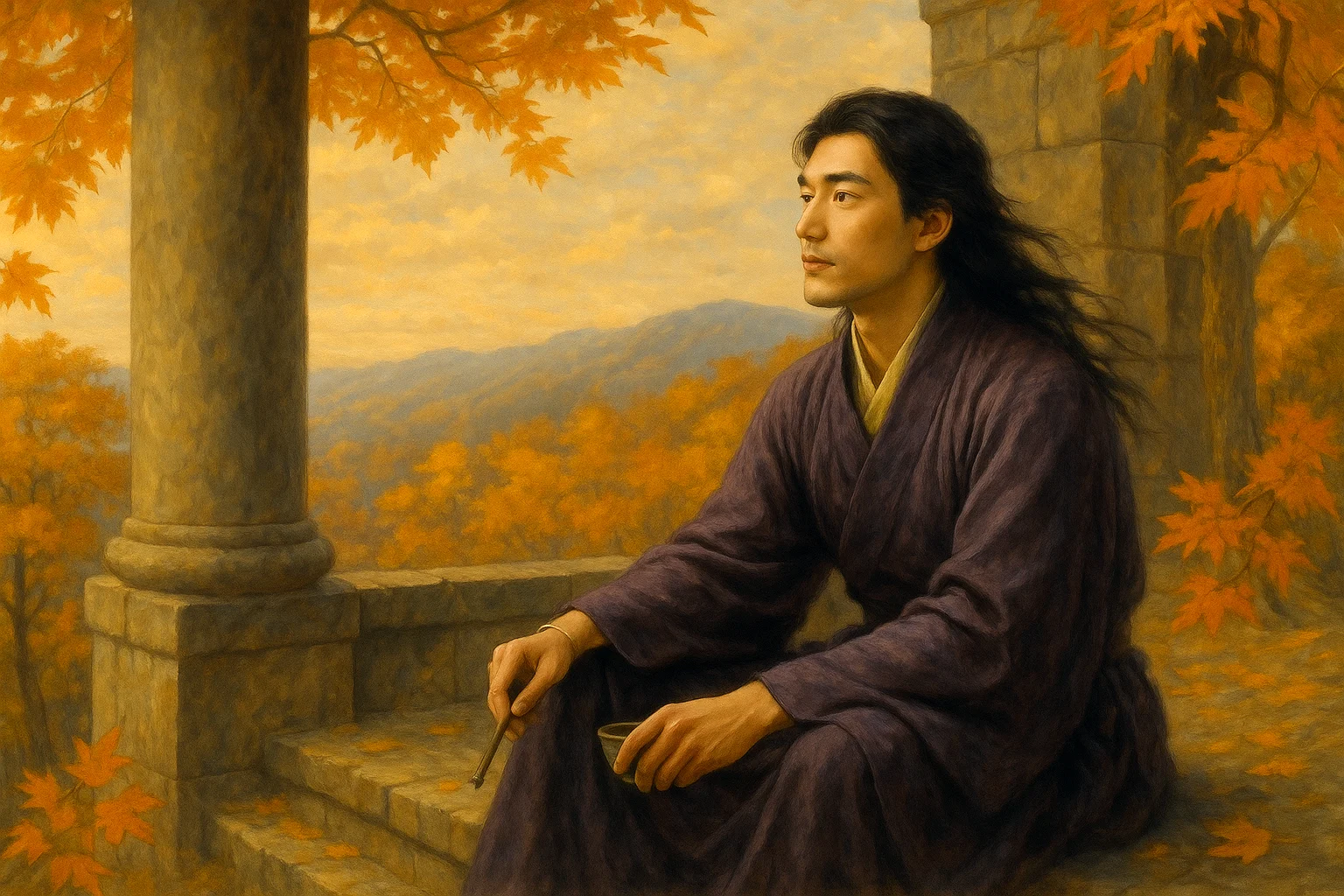Imperial envoys flutter with banners ahead,
Through Longxi's barren paths where ruined towns spread.
Felt-clad nomads tend foals - mere lads so slight,
At dusk, three-two barbaric songs take flight.
Original Poem
「凉州词」
耿玮
国使翻翻随旆旌,陇西岐路足荒城。
毡裘牧马胡雏小,日暮蕃歌三两声。
Interpretation
This poem was composed during the peak of Tang frontier poetry. Geng Wei, who had early military experience on the borders after attempting the imperial examinations, wrote this during an official mission or journey to record the desolate northwestern frontier and its exotic customs. Liangzhou (modern Wuwei, Gansu) - a crucial gateway to the Western Regions - served as a cultural crossroads where Han and nomadic traditions intermingled. Through its depiction of Liangzhou's landscapes and foreign lifestyles, the poem reflects both the isolation and diversity of border regions, embodying classic frontier poetry characteristics.
First Couplet: "国使翻翻随旆旌,陇西岐路足荒城。"
Guó shǐ fān fān suí pèi jīng, Lǒng xī qí lù zú huāng chéng.
The envoy's robes flap with banners ahead,
Where Longxi's forked roads weave through ruined cities long dead.
The fluttering "flap" (翻翻) of the envoy's robes mirrors the waving banners, creating dynamic movement. By identifying himself as the "envoy," the poet lends authenticity to the scene. The "forked roads" (岐路) through desolate cities emphasize both the journey's hardship and the frontier's abandoned isolation.
Second Couplet: "毡裘牧马胡雏小,日暮蕃歌三两声。"
Zhān qiú mù mǎ hú chú xiǎo, rì mù fān gē sān liǎng shēng.
In felt coats, nomad boys tend horses small,
While twilight carries foreign songs - two notes, that's all.
This couplet captures intimate frontier life. The "nomad boys" (胡雏小) embody youthful vitality against the bleak backdrop. The sparse "two notes" (三两声) of evening songs evoke exotic melancholy, their faint echoes deepening the dusk's lonely chill. The scene vibrates between cultural curiosity and existential solitude.
Holistic Appreciation
The poem depicts the customs and landscapes of the northwestern frontier through the lens of an "imperial envoy," creating an atmosphere of vast desolation. Images such as the "desolate town," "felt robes," and "foreign songs" vividly capture the geographical and cultural essence of Liangzhou. Geng Wei not only portrays the wilderness of the borderlands but also incorporates keen observations of ethnic traditions, reflecting an attitude of objective contemplation and quiet acceptance. Without directly addressing war, the poem conveys the lived realities of people against the backdrop of the era, showcasing the poet's restrained, precise, and measured style.
Artistic Merits
- Strong Cinematic Quality, Vivid Imagery: The verses unfold like a sequence of scenes—from "fluttering banners" to the "desolate town," from "grazing horses" to "foreign songs"—each transition smooth and visually evocative.
- Concise Language, Profound Meaning: The phrase "two or three notes" achieves much with little, not only evoking the stillness of dusk but also hinting at cultural encounters and contrasts.
- Blend of Documentary Realism and Poetic Sensibility: Combining firsthand observation with subtle emotion, the poem reveals Geng Wei's meticulous eye and understated artistic sensibility.
Insights
This poem reminds us to focus on the lived experiences within cultural crossroads rather than viewing history solely through grand narratives. The frontier, often a site of conflict, is also a space of ethnic exchange. Through a poet's gaze, Geng Wei records the everyday, highlighting warmth and ordinary humanity amid harsh landscapes. In today's world of deepening multicultural exchange, this approach—respecting differences and rendering them with nuance—remains invaluable.
About the poet

Geng Wei (耿湋, dates unknown), a Tang dynasty poet from Yongji, Shanxi, was among the "Ten Great Talents of the Dali Era." Renowned for his mastery of five-character regulated verse, his poetry is distinguished by its economical diction and tranquil imagery. While the prevailing style of Dali poetry tended toward austerity and desolation, Geng Wei developed a distinctive voice marked by understated naturalism.












